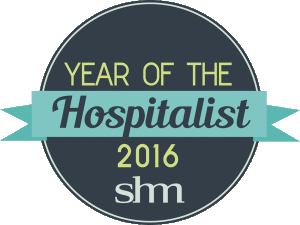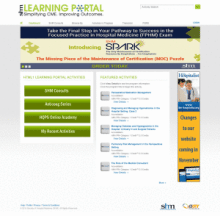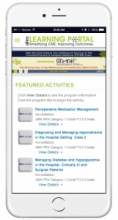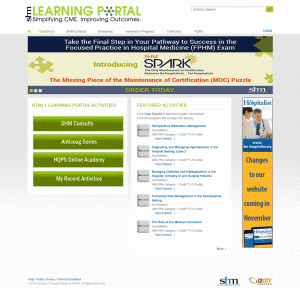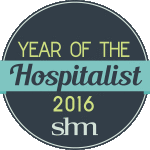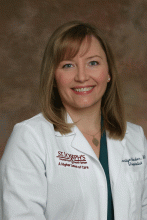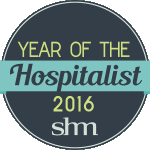User login
Preorder 2016 State of Hospital Medicine Report
The State of Hospital Medicine (SoHM) report is the most comprehensive survey of hospital medicine in the country and provides current data on hospitalist compensation and production and also covers practice demographics, staffing levels, staff growth, and compensation models.
“The SoHM report is an indispensable tool for hospital medicine group directors,” says Andrew White, MD, SFHM, a member of SHM’s Practice Analysis Committee. “It has helped us to evaluate and benchmark the support we receive from our hospital. I really appreciate the breakdown by characteristics, such as region of the country, academic practice, pediatrics, family medicine, and the involvement of NP and PA providers.
“The SoHM represents an excellent value—it has a ton of information in an easy-to-read format.”
Don’t miss out on getting your copy when it becomes available. Sign up to be notified when the report is released in September 2016 at www.hospitalmedicine.org/Survey.
Brett Radler is SHM’s communications coordinator.
The State of Hospital Medicine (SoHM) report is the most comprehensive survey of hospital medicine in the country and provides current data on hospitalist compensation and production and also covers practice demographics, staffing levels, staff growth, and compensation models.
“The SoHM report is an indispensable tool for hospital medicine group directors,” says Andrew White, MD, SFHM, a member of SHM’s Practice Analysis Committee. “It has helped us to evaluate and benchmark the support we receive from our hospital. I really appreciate the breakdown by characteristics, such as region of the country, academic practice, pediatrics, family medicine, and the involvement of NP and PA providers.
“The SoHM represents an excellent value—it has a ton of information in an easy-to-read format.”
Don’t miss out on getting your copy when it becomes available. Sign up to be notified when the report is released in September 2016 at www.hospitalmedicine.org/Survey.
Brett Radler is SHM’s communications coordinator.
The State of Hospital Medicine (SoHM) report is the most comprehensive survey of hospital medicine in the country and provides current data on hospitalist compensation and production and also covers practice demographics, staffing levels, staff growth, and compensation models.
“The SoHM report is an indispensable tool for hospital medicine group directors,” says Andrew White, MD, SFHM, a member of SHM’s Practice Analysis Committee. “It has helped us to evaluate and benchmark the support we receive from our hospital. I really appreciate the breakdown by characteristics, such as region of the country, academic practice, pediatrics, family medicine, and the involvement of NP and PA providers.
“The SoHM represents an excellent value—it has a ton of information in an easy-to-read format.”
Don’t miss out on getting your copy when it becomes available. Sign up to be notified when the report is released in September 2016 at www.hospitalmedicine.org/Survey.
Brett Radler is SHM’s communications coordinator.
Hospitalist Administrator Amanda Trask, MBA, MHA, Implements SHM Recommendations at Catholic Health Initiatives
Question: What attracted you to become involved with SHM?
Q: How has your experience with SHM brought value to your professional career?
A: Not long after I joined, I realized that SHM features a very welcoming body of members, and it encourages regular conversation about how to solve complex problems in our continuously evolving world of healthcare delivery. What I find so valuable is that SHM provides members with ample avenues to share results, success stories, challenges, and more—whether that is at the annual meetings or through the Journal of Hospital Medicine, The Hospitalist, the Hospital Medicine Exchange (HMX), social media, and more.
As a result of this culture of inclusivity, I accepted a role on the Practice Administrators Committee and subsequently on the Practice Analysis Committee as a way to further engage with SHM and network with other hospital medicine professionals. Two SHM resources I refer to on a regular basis are the Key Principles and Characteristics of an Effective Hospital Medicine Group and the biannual State of Hospital Medicine survey. Having access to key recommendations and research about hospital medicine is critical, but knowing that it was endorsed by the society dedicated to hospital medicine added extra emphasis to its relevance.
Q: How has CHI used these resources to inform decisions about hospitalist practice and leadership?
A: The list of key principles and characteristics is especially helpful with our hospitalist dyad leadership model at CHI, in which we pair strong medical and business leaders together to collectively lead and improve each division. The two key principles we always come back to are the first two: effective leadership and engaged hospitalists. The foundation of high-quality care and financial success is engaged hospitalists, requiring a meaningful relationship between hospitalists and hospital leaders. Both strategic business and medical leadership are essential to sustaining performance. For example, by having strong leadership and engaged hospitalists, we have been able to develop and implement clinical standards based on primary evidence to improve patient outcomes. By incorporating recommendations from the key principles and characteristics, we continue to advance and evolve our model to best meet our hospitalists’—and our communities’—needs.
The State of Hospital Medicine survey is a valuable asset when we’re evaluating care teams and staffing models. Reviewing data that cover what others have done—whether it is about incorporating advanced practice clinicians (NPs and PAs) into the hospital medicine group, evaluating a nocturnist model, or looking at how others have handled differentiation of schedules—ensures we not only incorporate these best practices into our decision-making process but also allows us to consider how our processes compare to others. Tie this back in with the key characteristics, and you can understand what staffing model and resources you need to build the hospital medicine group that best fits your hospital and its local needs.
Q: SHM is celebrating the 20th anniversary of hospital medicine with the “Year of the Hospitalist.” Why do you think hospital medicine continues to experience such unparalleled growth and success?
A: Hospital medicine continues to grow because it has been proven that with a focused team of caregivers, outcomes can be much better. Everyone in the industry is trying to improve quality outcomes, optimizing the right care in the right place at the right time while accomplishing this with the highest of patient satisfaction. As a result, the bar continues to be raised. There is an increasing demand for subspecialty hospitalists, and hospitalists are also in high demand in the continuum of care, outside the walls of the hospital, to care for patients in pre- and post-acute-care settings. All of this, in addition to the shift to payment for value versus volume, increases the demand for hospitalists. TH
Brett Radler is SHM’s communications coordinator.
Question: What attracted you to become involved with SHM?
Q: How has your experience with SHM brought value to your professional career?
A: Not long after I joined, I realized that SHM features a very welcoming body of members, and it encourages regular conversation about how to solve complex problems in our continuously evolving world of healthcare delivery. What I find so valuable is that SHM provides members with ample avenues to share results, success stories, challenges, and more—whether that is at the annual meetings or through the Journal of Hospital Medicine, The Hospitalist, the Hospital Medicine Exchange (HMX), social media, and more.
As a result of this culture of inclusivity, I accepted a role on the Practice Administrators Committee and subsequently on the Practice Analysis Committee as a way to further engage with SHM and network with other hospital medicine professionals. Two SHM resources I refer to on a regular basis are the Key Principles and Characteristics of an Effective Hospital Medicine Group and the biannual State of Hospital Medicine survey. Having access to key recommendations and research about hospital medicine is critical, but knowing that it was endorsed by the society dedicated to hospital medicine added extra emphasis to its relevance.
Q: How has CHI used these resources to inform decisions about hospitalist practice and leadership?
A: The list of key principles and characteristics is especially helpful with our hospitalist dyad leadership model at CHI, in which we pair strong medical and business leaders together to collectively lead and improve each division. The two key principles we always come back to are the first two: effective leadership and engaged hospitalists. The foundation of high-quality care and financial success is engaged hospitalists, requiring a meaningful relationship between hospitalists and hospital leaders. Both strategic business and medical leadership are essential to sustaining performance. For example, by having strong leadership and engaged hospitalists, we have been able to develop and implement clinical standards based on primary evidence to improve patient outcomes. By incorporating recommendations from the key principles and characteristics, we continue to advance and evolve our model to best meet our hospitalists’—and our communities’—needs.
The State of Hospital Medicine survey is a valuable asset when we’re evaluating care teams and staffing models. Reviewing data that cover what others have done—whether it is about incorporating advanced practice clinicians (NPs and PAs) into the hospital medicine group, evaluating a nocturnist model, or looking at how others have handled differentiation of schedules—ensures we not only incorporate these best practices into our decision-making process but also allows us to consider how our processes compare to others. Tie this back in with the key characteristics, and you can understand what staffing model and resources you need to build the hospital medicine group that best fits your hospital and its local needs.
Q: SHM is celebrating the 20th anniversary of hospital medicine with the “Year of the Hospitalist.” Why do you think hospital medicine continues to experience such unparalleled growth and success?
A: Hospital medicine continues to grow because it has been proven that with a focused team of caregivers, outcomes can be much better. Everyone in the industry is trying to improve quality outcomes, optimizing the right care in the right place at the right time while accomplishing this with the highest of patient satisfaction. As a result, the bar continues to be raised. There is an increasing demand for subspecialty hospitalists, and hospitalists are also in high demand in the continuum of care, outside the walls of the hospital, to care for patients in pre- and post-acute-care settings. All of this, in addition to the shift to payment for value versus volume, increases the demand for hospitalists. TH
Brett Radler is SHM’s communications coordinator.
Question: What attracted you to become involved with SHM?
Q: How has your experience with SHM brought value to your professional career?
A: Not long after I joined, I realized that SHM features a very welcoming body of members, and it encourages regular conversation about how to solve complex problems in our continuously evolving world of healthcare delivery. What I find so valuable is that SHM provides members with ample avenues to share results, success stories, challenges, and more—whether that is at the annual meetings or through the Journal of Hospital Medicine, The Hospitalist, the Hospital Medicine Exchange (HMX), social media, and more.
As a result of this culture of inclusivity, I accepted a role on the Practice Administrators Committee and subsequently on the Practice Analysis Committee as a way to further engage with SHM and network with other hospital medicine professionals. Two SHM resources I refer to on a regular basis are the Key Principles and Characteristics of an Effective Hospital Medicine Group and the biannual State of Hospital Medicine survey. Having access to key recommendations and research about hospital medicine is critical, but knowing that it was endorsed by the society dedicated to hospital medicine added extra emphasis to its relevance.
Q: How has CHI used these resources to inform decisions about hospitalist practice and leadership?
A: The list of key principles and characteristics is especially helpful with our hospitalist dyad leadership model at CHI, in which we pair strong medical and business leaders together to collectively lead and improve each division. The two key principles we always come back to are the first two: effective leadership and engaged hospitalists. The foundation of high-quality care and financial success is engaged hospitalists, requiring a meaningful relationship between hospitalists and hospital leaders. Both strategic business and medical leadership are essential to sustaining performance. For example, by having strong leadership and engaged hospitalists, we have been able to develop and implement clinical standards based on primary evidence to improve patient outcomes. By incorporating recommendations from the key principles and characteristics, we continue to advance and evolve our model to best meet our hospitalists’—and our communities’—needs.
The State of Hospital Medicine survey is a valuable asset when we’re evaluating care teams and staffing models. Reviewing data that cover what others have done—whether it is about incorporating advanced practice clinicians (NPs and PAs) into the hospital medicine group, evaluating a nocturnist model, or looking at how others have handled differentiation of schedules—ensures we not only incorporate these best practices into our decision-making process but also allows us to consider how our processes compare to others. Tie this back in with the key characteristics, and you can understand what staffing model and resources you need to build the hospital medicine group that best fits your hospital and its local needs.
Q: SHM is celebrating the 20th anniversary of hospital medicine with the “Year of the Hospitalist.” Why do you think hospital medicine continues to experience such unparalleled growth and success?
A: Hospital medicine continues to grow because it has been proven that with a focused team of caregivers, outcomes can be much better. Everyone in the industry is trying to improve quality outcomes, optimizing the right care in the right place at the right time while accomplishing this with the highest of patient satisfaction. As a result, the bar continues to be raised. There is an increasing demand for subspecialty hospitalists, and hospitalists are also in high demand in the continuum of care, outside the walls of the hospital, to care for patients in pre- and post-acute-care settings. All of this, in addition to the shift to payment for value versus volume, increases the demand for hospitalists. TH
Brett Radler is SHM’s communications coordinator.
Leadership Academy to Be Held in Florida
A successful hospitalist program requires strong leadership from the floor to the C-suite. SHM’s Leadership Academy prepares clinical and academic leaders with vital skills traditionally not taught in medical school or typical residency programs. This year’s meeting will be held from October 24 to 27 at Disney’s BoardWalk Inn in Lake Buena Vista, Fla. Courses offered include:
- Leadership Foundations: Evaluate your personal leadership strengths and weaknesses, understand key hospital drivers, and more.
- Advanced Leadership: Influential Management: Learn the skills needed to drive culture change through specific leadership behaviors and actions as well as financial storytelling.
(Prerequisite: Leadership Foundations or an advanced management degree upon course director approval.)
- Advanced Leadership: Mastering Teamwork: Learn to critically assess program growth opportunities, lead and motivate teams, and design effective communication strategies. (Prerequisite: Leadership Foundations or an advanced management degree upon course director approval.)
Build the skills and resources necessary to successfully lead and manage a hospital medicine program now and in the future. Learn more at www.shmleadershipacademy.org.
A successful hospitalist program requires strong leadership from the floor to the C-suite. SHM’s Leadership Academy prepares clinical and academic leaders with vital skills traditionally not taught in medical school or typical residency programs. This year’s meeting will be held from October 24 to 27 at Disney’s BoardWalk Inn in Lake Buena Vista, Fla. Courses offered include:
- Leadership Foundations: Evaluate your personal leadership strengths and weaknesses, understand key hospital drivers, and more.
- Advanced Leadership: Influential Management: Learn the skills needed to drive culture change through specific leadership behaviors and actions as well as financial storytelling.
(Prerequisite: Leadership Foundations or an advanced management degree upon course director approval.)
- Advanced Leadership: Mastering Teamwork: Learn to critically assess program growth opportunities, lead and motivate teams, and design effective communication strategies. (Prerequisite: Leadership Foundations or an advanced management degree upon course director approval.)
Build the skills and resources necessary to successfully lead and manage a hospital medicine program now and in the future. Learn more at www.shmleadershipacademy.org.
A successful hospitalist program requires strong leadership from the floor to the C-suite. SHM’s Leadership Academy prepares clinical and academic leaders with vital skills traditionally not taught in medical school or typical residency programs. This year’s meeting will be held from October 24 to 27 at Disney’s BoardWalk Inn in Lake Buena Vista, Fla. Courses offered include:
- Leadership Foundations: Evaluate your personal leadership strengths and weaknesses, understand key hospital drivers, and more.
- Advanced Leadership: Influential Management: Learn the skills needed to drive culture change through specific leadership behaviors and actions as well as financial storytelling.
(Prerequisite: Leadership Foundations or an advanced management degree upon course director approval.)
- Advanced Leadership: Mastering Teamwork: Learn to critically assess program growth opportunities, lead and motivate teams, and design effective communication strategies. (Prerequisite: Leadership Foundations or an advanced management degree upon course director approval.)
Build the skills and resources necessary to successfully lead and manage a hospital medicine program now and in the future. Learn more at www.shmleadershipacademy.org.
Free Webinars Aim to Help Reduce Admissions, Optimize Glycemic Control
Last month, SHM presented live webinars on two of its signature mentored implementation programs that continue to change the way hospitals manage readmissions and glycemic control.
Find out how Project BOOST can help your hospital reduce preventable readmissions, decrease average length of stay, and improve patient satisfaction with one year of individualized mentoring from a physician leader. Watch the webinar at www.hospitalmedicine.org/BOOST.
Another signature program, SHM’s Glycemic Control Mentored Implementation program, has supported the development and implementation of glycemic control in more than 100 hospitals nationwide; added benefits include data collection and analysis tools, monthly coaching calls with mentors, SHM-facilitated calls, and more. View the free webinar to learn more at www.hospitalmedicine.org/gc.
Last month, SHM presented live webinars on two of its signature mentored implementation programs that continue to change the way hospitals manage readmissions and glycemic control.
Find out how Project BOOST can help your hospital reduce preventable readmissions, decrease average length of stay, and improve patient satisfaction with one year of individualized mentoring from a physician leader. Watch the webinar at www.hospitalmedicine.org/BOOST.
Another signature program, SHM’s Glycemic Control Mentored Implementation program, has supported the development and implementation of glycemic control in more than 100 hospitals nationwide; added benefits include data collection and analysis tools, monthly coaching calls with mentors, SHM-facilitated calls, and more. View the free webinar to learn more at www.hospitalmedicine.org/gc.
Last month, SHM presented live webinars on two of its signature mentored implementation programs that continue to change the way hospitals manage readmissions and glycemic control.
Find out how Project BOOST can help your hospital reduce preventable readmissions, decrease average length of stay, and improve patient satisfaction with one year of individualized mentoring from a physician leader. Watch the webinar at www.hospitalmedicine.org/BOOST.
Another signature program, SHM’s Glycemic Control Mentored Implementation program, has supported the development and implementation of glycemic control in more than 100 hospitals nationwide; added benefits include data collection and analysis tools, monthly coaching calls with mentors, SHM-facilitated calls, and more. View the free webinar to learn more at www.hospitalmedicine.org/gc.
Register for Pediatric Hospital Medicine 2016
Register now. Pediatric Hospital Medicine (PHM) 2016 is the premier educational conference for pediatric hospitalists and other clinicians involved in the care of hospitalized children. This year, PHM 2016 will be held at the Hyatt Regency Chicago in Illinois from July 28 to 31. For the latest information, visit www.phmmeeting.org.
Register now. Pediatric Hospital Medicine (PHM) 2016 is the premier educational conference for pediatric hospitalists and other clinicians involved in the care of hospitalized children. This year, PHM 2016 will be held at the Hyatt Regency Chicago in Illinois from July 28 to 31. For the latest information, visit www.phmmeeting.org.
Register now. Pediatric Hospital Medicine (PHM) 2016 is the premier educational conference for pediatric hospitalists and other clinicians involved in the care of hospitalized children. This year, PHM 2016 will be held at the Hyatt Regency Chicago in Illinois from July 28 to 31. For the latest information, visit www.phmmeeting.org.
Apply for SHM Fellowship
Have you been a practicing hospitalist for five years, a member of SHM for three years, and an attendee at an SHM annual meeting? If so, you may be eligible to set yourself apart as a leader in the hospital medicine movement who is committed to quality, improved outcomes, and exceptional patient care.
Physicians, nurse practitioners, physician assistants, and practice administrators are invited to apply to the Fellow (FHM) or Senior Fellow (SFHM) in Hospital Medicine designation from SHM.
Learn more at www.hospitalmedicine.org/fellow. Applications will be open for the SHM Fellows Class of 2017 from May 23, 2016, to November 18, 2016.
Have you been a practicing hospitalist for five years, a member of SHM for three years, and an attendee at an SHM annual meeting? If so, you may be eligible to set yourself apart as a leader in the hospital medicine movement who is committed to quality, improved outcomes, and exceptional patient care.
Physicians, nurse practitioners, physician assistants, and practice administrators are invited to apply to the Fellow (FHM) or Senior Fellow (SFHM) in Hospital Medicine designation from SHM.
Learn more at www.hospitalmedicine.org/fellow. Applications will be open for the SHM Fellows Class of 2017 from May 23, 2016, to November 18, 2016.
Have you been a practicing hospitalist for five years, a member of SHM for three years, and an attendee at an SHM annual meeting? If so, you may be eligible to set yourself apart as a leader in the hospital medicine movement who is committed to quality, improved outcomes, and exceptional patient care.
Physicians, nurse practitioners, physician assistants, and practice administrators are invited to apply to the Fellow (FHM) or Senior Fellow (SFHM) in Hospital Medicine designation from SHM.
Learn more at www.hospitalmedicine.org/fellow. Applications will be open for the SHM Fellows Class of 2017 from May 23, 2016, to November 18, 2016.
New Tool Kit Available for Treating Patients with VTE
To ensure hospitalists have the latest information about diagnosis, treatment, and transition of hospitalized patients with venous thromboembolism (VTE), SHM has developed:
- An online tool kit, including a literature review; implementation guide; and other references, materials, and tools such as discharge instructions and checklists
- A webinar series with free CME
These resources are now available. Get the scoop at www.hospitalmedicine.org/VTEtreatment.
To ensure hospitalists have the latest information about diagnosis, treatment, and transition of hospitalized patients with venous thromboembolism (VTE), SHM has developed:
- An online tool kit, including a literature review; implementation guide; and other references, materials, and tools such as discharge instructions and checklists
- A webinar series with free CME
These resources are now available. Get the scoop at www.hospitalmedicine.org/VTEtreatment.
To ensure hospitalists have the latest information about diagnosis, treatment, and transition of hospitalized patients with venous thromboembolism (VTE), SHM has developed:
- An online tool kit, including a literature review; implementation guide; and other references, materials, and tools such as discharge instructions and checklists
- A webinar series with free CME
These resources are now available. Get the scoop at www.hospitalmedicine.org/VTEtreatment.
SHM Launches Enhanced SHM Learning Portal
You asked, we listened: Introducing the enhanced SHM Learning Portal!
The SHM Learning Portal, the online learning home for hospitalists with all eLearning initiatives in one place, just launched a brand-new responsive design in March 2016. Feedback gathered by the Learning Portal team in the summer and fall of 2015 was used to develop a more user-friendly design aimed at reducing the time it takes to discover and access a growing catalog of educational content.
Mobile enhancements now allow for easy access and navigation on the go. Check out the new design for yourself at www.shmlearningportal.org.
You asked, we listened: Introducing the enhanced SHM Learning Portal!
The SHM Learning Portal, the online learning home for hospitalists with all eLearning initiatives in one place, just launched a brand-new responsive design in March 2016. Feedback gathered by the Learning Portal team in the summer and fall of 2015 was used to develop a more user-friendly design aimed at reducing the time it takes to discover and access a growing catalog of educational content.
Mobile enhancements now allow for easy access and navigation on the go. Check out the new design for yourself at www.shmlearningportal.org.
You asked, we listened: Introducing the enhanced SHM Learning Portal!
The SHM Learning Portal, the online learning home for hospitalists with all eLearning initiatives in one place, just launched a brand-new responsive design in March 2016. Feedback gathered by the Learning Portal team in the summer and fall of 2015 was used to develop a more user-friendly design aimed at reducing the time it takes to discover and access a growing catalog of educational content.
Mobile enhancements now allow for easy access and navigation on the go. Check out the new design for yourself at www.shmlearningportal.org.
Survey Helps Assess Engagement of Your Hospital Medicine Group
Engaged hospitalists drive quality care, and SHM has the tools to help you assess the level of engagement of hospitalists in your hospital medicine group. SHM offered a Hospitalist Engagement Benchmarking Service in 2015 and analyzed engagement of approximately 1,500 hospitalists. The survey can help open conversations about everything from relationships with the C-suite to sustaining teamwork.
Help ensure hospitalists are engaged in your hospital medicine group by registering now for the next cohort of the Hospitalist Engagement Benchmarking Service at www.hospitalmedicine.org/engage.
Engaged hospitalists drive quality care, and SHM has the tools to help you assess the level of engagement of hospitalists in your hospital medicine group. SHM offered a Hospitalist Engagement Benchmarking Service in 2015 and analyzed engagement of approximately 1,500 hospitalists. The survey can help open conversations about everything from relationships with the C-suite to sustaining teamwork.
Help ensure hospitalists are engaged in your hospital medicine group by registering now for the next cohort of the Hospitalist Engagement Benchmarking Service at www.hospitalmedicine.org/engage.
Engaged hospitalists drive quality care, and SHM has the tools to help you assess the level of engagement of hospitalists in your hospital medicine group. SHM offered a Hospitalist Engagement Benchmarking Service in 2015 and analyzed engagement of approximately 1,500 hospitalists. The survey can help open conversations about everything from relationships with the C-suite to sustaining teamwork.
Help ensure hospitalists are engaged in your hospital medicine group by registering now for the next cohort of the Hospitalist Engagement Benchmarking Service at www.hospitalmedicine.org/engage.
SHM Welcomes Member No. 15,000
Now with 15,000 members and growing, SHM continues to change the face of medicine—one patient at a time. We recently spoke with Dr. Glauber about her path to hospital medicine and why she believes in its continued growth and success during these times of unprecedented change.
Question: What steered you toward a career in hospital medicine?
Answer: Believe it or not, I did not enter medical school at New York Medical College with dreams of becoming a hospitalist. I first became aware of hospital medicine as a career path during my internal medicine residency at Loyola University School of Medicine in Maywood, Ill. I had some great hospitalist mentors during residency who clearly enjoyed their careers.
As I completed my training, hospital medicine was the clear choice for me. I wanted to manage patients with a variety of diagnoses and wasn’t ready to limit myself to any one subspecialty. I had always found diagnosis and management of acutely ill hospitalized patients to be the most interesting part of medicine, and I thoroughly enjoy working in the hospital environment. The field of hospital medicine was rapidly evolving, and I was curious to see where I could go with it. After four years, I can say with confidence that it has been a great experience.
Q: What do you see as the most rewarding part of your job?
A: Although my experiences practicing hospital medicine have been rewarding in a variety of ways, in the end, it’s pretty simple: I get satisfaction from helping my patients heal and helping them through the experience of hospitalization. It may take days, or it may take months to accomplish, and it is often the result of a cumulative effort of numerous hospitalists, consultants, and the entire hospital staff. But the reward for me is seeing my patient sitting in a chair, dressed in their street clothes, and waiting for their ride to come pick them up.
Q: Why do you think hospital medicine is the fastest-growing specialty in medicine? How can this momentum be sustained moving forward?
A: The growth of hospital medicine reflects the changing landscape of medicine nationwide. Hospitalist jobs are available because hospitals recognize the benefits of having us on hand to provide efficient and quality care to the patients. In terms of career choices, it is appealing to those coming straight out of residency, more experienced physicians practicing outpatient medicine, and even subspecialists who are looking for a career change. It is a satisfying and interesting job, which by nature benefits from unconventional work schedules. I think this flexibility is a big draw as well, in addition to the rewarding career.
Q: Why were you intrigued to join SHM and also attend Hospital Medicine 2016 (HM16)?
A: I think joining SHM is probably long overdue! I have been practicing for four years and feel that it’s time to take stock of my strengths and weaknesses as a hospitalist and try to improve. Through SHM, I can stay up to date on relevant medical topics, including everything from antibiotic resistance to glycemic control, as well as learn how to be a better hospitalist through the experience and research of colleagues. Attending HM16 seemed like a great way to get started, learn some new things, and network with hospitalists around the country.
Q: As a new member to SHM, what do you hope to gain from your membership?
A: I hope to hone my skills as a hospitalist and keep my finger on the pulse of hospital medicine. Keeping abreast of recent developments in medical knowledge and patient management is crucial to providing excellent patient care. There are also many other aspects of our day-to-day practice—for example, documentation and billing—that we weren’t taught how to manage in medical school. By joining SHM, I expect to benefit from the advice and experience of other hospitalists to improve my performance in these areas—and probably more I’ll learn about along the way.
Brett Radler is SHM’s communications coordinator.
Now with 15,000 members and growing, SHM continues to change the face of medicine—one patient at a time. We recently spoke with Dr. Glauber about her path to hospital medicine and why she believes in its continued growth and success during these times of unprecedented change.
Question: What steered you toward a career in hospital medicine?
Answer: Believe it or not, I did not enter medical school at New York Medical College with dreams of becoming a hospitalist. I first became aware of hospital medicine as a career path during my internal medicine residency at Loyola University School of Medicine in Maywood, Ill. I had some great hospitalist mentors during residency who clearly enjoyed their careers.
As I completed my training, hospital medicine was the clear choice for me. I wanted to manage patients with a variety of diagnoses and wasn’t ready to limit myself to any one subspecialty. I had always found diagnosis and management of acutely ill hospitalized patients to be the most interesting part of medicine, and I thoroughly enjoy working in the hospital environment. The field of hospital medicine was rapidly evolving, and I was curious to see where I could go with it. After four years, I can say with confidence that it has been a great experience.
Q: What do you see as the most rewarding part of your job?
A: Although my experiences practicing hospital medicine have been rewarding in a variety of ways, in the end, it’s pretty simple: I get satisfaction from helping my patients heal and helping them through the experience of hospitalization. It may take days, or it may take months to accomplish, and it is often the result of a cumulative effort of numerous hospitalists, consultants, and the entire hospital staff. But the reward for me is seeing my patient sitting in a chair, dressed in their street clothes, and waiting for their ride to come pick them up.
Q: Why do you think hospital medicine is the fastest-growing specialty in medicine? How can this momentum be sustained moving forward?
A: The growth of hospital medicine reflects the changing landscape of medicine nationwide. Hospitalist jobs are available because hospitals recognize the benefits of having us on hand to provide efficient and quality care to the patients. In terms of career choices, it is appealing to those coming straight out of residency, more experienced physicians practicing outpatient medicine, and even subspecialists who are looking for a career change. It is a satisfying and interesting job, which by nature benefits from unconventional work schedules. I think this flexibility is a big draw as well, in addition to the rewarding career.
Q: Why were you intrigued to join SHM and also attend Hospital Medicine 2016 (HM16)?
A: I think joining SHM is probably long overdue! I have been practicing for four years and feel that it’s time to take stock of my strengths and weaknesses as a hospitalist and try to improve. Through SHM, I can stay up to date on relevant medical topics, including everything from antibiotic resistance to glycemic control, as well as learn how to be a better hospitalist through the experience and research of colleagues. Attending HM16 seemed like a great way to get started, learn some new things, and network with hospitalists around the country.
Q: As a new member to SHM, what do you hope to gain from your membership?
A: I hope to hone my skills as a hospitalist and keep my finger on the pulse of hospital medicine. Keeping abreast of recent developments in medical knowledge and patient management is crucial to providing excellent patient care. There are also many other aspects of our day-to-day practice—for example, documentation and billing—that we weren’t taught how to manage in medical school. By joining SHM, I expect to benefit from the advice and experience of other hospitalists to improve my performance in these areas—and probably more I’ll learn about along the way.
Brett Radler is SHM’s communications coordinator.
Now with 15,000 members and growing, SHM continues to change the face of medicine—one patient at a time. We recently spoke with Dr. Glauber about her path to hospital medicine and why she believes in its continued growth and success during these times of unprecedented change.
Question: What steered you toward a career in hospital medicine?
Answer: Believe it or not, I did not enter medical school at New York Medical College with dreams of becoming a hospitalist. I first became aware of hospital medicine as a career path during my internal medicine residency at Loyola University School of Medicine in Maywood, Ill. I had some great hospitalist mentors during residency who clearly enjoyed their careers.
As I completed my training, hospital medicine was the clear choice for me. I wanted to manage patients with a variety of diagnoses and wasn’t ready to limit myself to any one subspecialty. I had always found diagnosis and management of acutely ill hospitalized patients to be the most interesting part of medicine, and I thoroughly enjoy working in the hospital environment. The field of hospital medicine was rapidly evolving, and I was curious to see where I could go with it. After four years, I can say with confidence that it has been a great experience.
Q: What do you see as the most rewarding part of your job?
A: Although my experiences practicing hospital medicine have been rewarding in a variety of ways, in the end, it’s pretty simple: I get satisfaction from helping my patients heal and helping them through the experience of hospitalization. It may take days, or it may take months to accomplish, and it is often the result of a cumulative effort of numerous hospitalists, consultants, and the entire hospital staff. But the reward for me is seeing my patient sitting in a chair, dressed in their street clothes, and waiting for their ride to come pick them up.
Q: Why do you think hospital medicine is the fastest-growing specialty in medicine? How can this momentum be sustained moving forward?
A: The growth of hospital medicine reflects the changing landscape of medicine nationwide. Hospitalist jobs are available because hospitals recognize the benefits of having us on hand to provide efficient and quality care to the patients. In terms of career choices, it is appealing to those coming straight out of residency, more experienced physicians practicing outpatient medicine, and even subspecialists who are looking for a career change. It is a satisfying and interesting job, which by nature benefits from unconventional work schedules. I think this flexibility is a big draw as well, in addition to the rewarding career.
Q: Why were you intrigued to join SHM and also attend Hospital Medicine 2016 (HM16)?
A: I think joining SHM is probably long overdue! I have been practicing for four years and feel that it’s time to take stock of my strengths and weaknesses as a hospitalist and try to improve. Through SHM, I can stay up to date on relevant medical topics, including everything from antibiotic resistance to glycemic control, as well as learn how to be a better hospitalist through the experience and research of colleagues. Attending HM16 seemed like a great way to get started, learn some new things, and network with hospitalists around the country.
Q: As a new member to SHM, what do you hope to gain from your membership?
A: I hope to hone my skills as a hospitalist and keep my finger on the pulse of hospital medicine. Keeping abreast of recent developments in medical knowledge and patient management is crucial to providing excellent patient care. There are also many other aspects of our day-to-day practice—for example, documentation and billing—that we weren’t taught how to manage in medical school. By joining SHM, I expect to benefit from the advice and experience of other hospitalists to improve my performance in these areas—and probably more I’ll learn about along the way.
Brett Radler is SHM’s communications coordinator.


